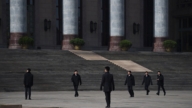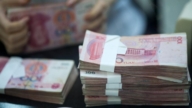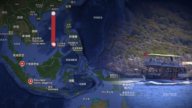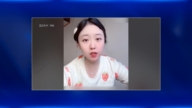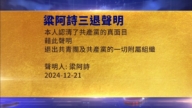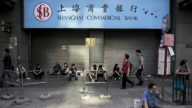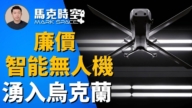【新唐人2014年04月17日讯】今年2月,一场由中共当局发起,由东莞波及全中国的“扫黄”行动,一度激起民间强烈的舆论反弹。风波刚刚平息,当局又将“扫黄”矛头指向了互联网。近期,一场由国家多个部门联合行动、各大媒体开动马力造势宣传、持续时间最长、打击力度、范围最大的“2014净网行动”,被大陆网民讽刺为:“文革”又来了。
据大陆官方媒体报导,4月13号,由中共“扫黄打非”办公室、互联网信息办公室、工业和信息化部、以及公安部,联合发布的公告宣称,从4月中旬到11月,全中国统一开展打击网上淫秽色情信息“扫黄打非•净网2014”专项行动。
公告发出后,各大官媒《新华社》、《央视》、《人民日报》等,开足马力为这次的网络“扫黄打非”造势宣传。短短几天内,就有几十家文学网站遭到查封和勒令整改,多名网站创始人和作家被抓,紧接着社交网站又遭“清洗”。
对此很多80、90后的网民自嘲:我们有生之年居然也经历了“文革”!民间也将这次网络“扫黄打非”,称作“史上规模最强、历时最长、力度最大”的政治运动。
虽然中共当局再三强调,2014“净网”的对像是所谓的“网络色情”,但舆论普遍认为,当局的这一波网络“扫黄”行动,如同之前的广东东莞“扫黄”行动一般——“醉翁之意不在酒”。
大陆《六四天网》创办人黄琦:“可以说最近十多年当局通过一系列扫黄打非行动,特别是在互联网方面的,总是有一些扩大化的倾向。严格说来,它们并不是仅仅界定于扫黄打非本身,而且将这种所谓扫黄打非扩大到对于同网络上异议声音的打压,也会对中国民间维权、访民、各界民众投诉贪污腐败,和一系列人权案件,产生负面影响。”
原《浙江青年报》记者魏桢凌:“其实扫黄是个借口,说到底,很多黄色网站其实还是存在,包括一些黄色的图片。所有的东西就是围绕一个——为了维持它政权的稳定。”
有分析指出,从中共当局历次“扫黄打非”的对像来看,这次以“扫黄”为名的“净网”行动,很可能是继去年对网络“大V”名人整肃后,中共当局又一次收紧言论的行为。
魏桢凌:“我们现在已经感到很明显的一点就是,微博已经打压的很厉害,接下去可能要对微信进行打压,包括对QQ等。因为现在很多网民都通过微信、通过QQ建立群组进行交流,那么这几个月形式对我们来讲,应该我们这行已经有很多人,因为微信的原因被传唤、被刑拘的人都有,所以我认为接下来形式肯定不会很好的,而且会越来越严重。”
早在今年3月底,中宣部等9个部门,已经在全中国范围内开展打击所谓“新闻敲诈”和“假新闻”专项行动。随后全国“扫黄打非办”又在会议上声称,即将开展“清源2014”、“净网2014”、“秋风2014”和“固边2014”等四个专项行动。
虽然当局没有对这四个专项行动做出解释,但《美国之音》分析认为,“清源”行动应该是指,从源头上截住境外互联网和卫星电视的那些所谓“有害信息”。矛头直指海外媒体。
魏桢凌:“国内的媒体都是党的喉舌嘛!它不允许报它是不会报的,往往有很多信息,很多新闻都是从国外进来的,老百姓真正要了解真相的话,或者真实新闻的话,那只有通过国外的这些网络或者媒体,所以说,它(中共)在这方面肯定要针对境外,它肯定会封的很厉害,它肯定要千方百计阻止你去了解。”
四川《六四天网》创建人黄琦表示,《六四天网》作为中国第一家维权网站,16年来对于中共另类变种的各种打压,他早已习以为常。黄琦认为,不管当局采取“扫黄打非”或者其他形式,只要敢于发声的媒体持之以恒,坚持言论自由、坚持报导民众的各种诉求、持续抗争,他相信,中国一定会走向“言论自由化”的春天。
采访编辑/张天宇 后制/李勇
Internet Crime Fighting Campaign Is Just Another Culture Revolution?
Since the Chinese Communist regime launched the campaign
against pornography in Dongguan this February, another
crime fighting campaign was initiated, targeting the Internet.
Netizens believed this multi departmental Web Cleaning 2014,
claimed by the nedia to cover nationwide, is another round of
“culture revolution.”
On April 13, the Web Cleaning 2014 was launched to crackdown
on Internet pornography.
The regime’s mouth piece reported that this campaign was jointly
issued by the National Office Against Pornographic and Illegal
Publications, the State Internet Information Office, the Ministry
of Industry and Information Technology and the Ministry of
Public Security.
Shortly after the circular was publicized by major media such as
Xinhua News Agency, CCTV, and People’s Daily, in just a few days,
dozens of websites were shut down and regulated to change, and
organizers and writers of the websites were arrested.
Numerous social media were also “cleaned”.
Many netizens born in the 80s and 90s mocked themselves:
To our surprise, we are here to experience a “cultural revolution!"
The general public refers to this on-line anti-porn campaign as
historically the toughest and longest political movement.
The Communist regime claims the target of the 2014 Web
Cleaning is porn.
However, people believe the ulterior motive of the officials is as
clear as the previous porn cleaning campaign in Dongguan.
Huang Qi, 64tianwang.com founder: “These series of anti-porn
activities, especially on the Internet, have been extended by the
authorities for the past ten years.
Strictly speaking, the crackdown on porn has not been limited to
porn, but extended to suppression of dissenting voices.
It has a negative impact on human rights and domestic
grievances about the corrupt officials and human rights violations."
Wei Zhenling, former Zhejiang Youth Daily correspondent:
“In fact, anti-porn is just an excuse.
After all, many porn websites continue to exist.
It is only done for one purpose, that is, to maintain the stability of
the regime."
the 2014 campaign is just another censorship tightening activity
against the Web bloggers after many arrests of the significant
bloggers last year.
Wei Zhenling: “We have learnt that suppression of Weibo has
been intense, WeChat is next, including QQ.
Netizens have exchanged information through WeChat and QQ,
and many of them have been summoned and arrested in these
months. I believe the situation is only getting worse."
In March, the Central Propaganda Department and nine other
departments have launched four campaigns to crackdown on
false news and news blackmail nationwide.
The regime did not explain what these four campaigns are, but
Voice of America had analyzed one of them, Qingyuan 2014,
literarily meaning cleaning the sources, i.e. to block so-called
harmful media and website information from overseas.
Wei Zhenling: “The domestic media are the party’s mouthpiece.
Any information, not permitted, is not publicized.
That’s why a lot of information came from overseas.
Those overseas websites or media are where Chinese can get the
truth and facts. That is why one of the campaigns targets overseas.
It is surely subject to strict censorship."
Huang Qi founded the first rights defending website,
64tianwang.com, in Sichuan.
He says that for 16 years, 64tianwang.com has been routinely
subject to various suppressions by the regime.
Huang Qi believes that, despite the forms of suppression such as
the Web Cleaning 2014, the persistent pursuit and insistence on
free expression and reporting will certainly greet the Spring of
free speech in China.


